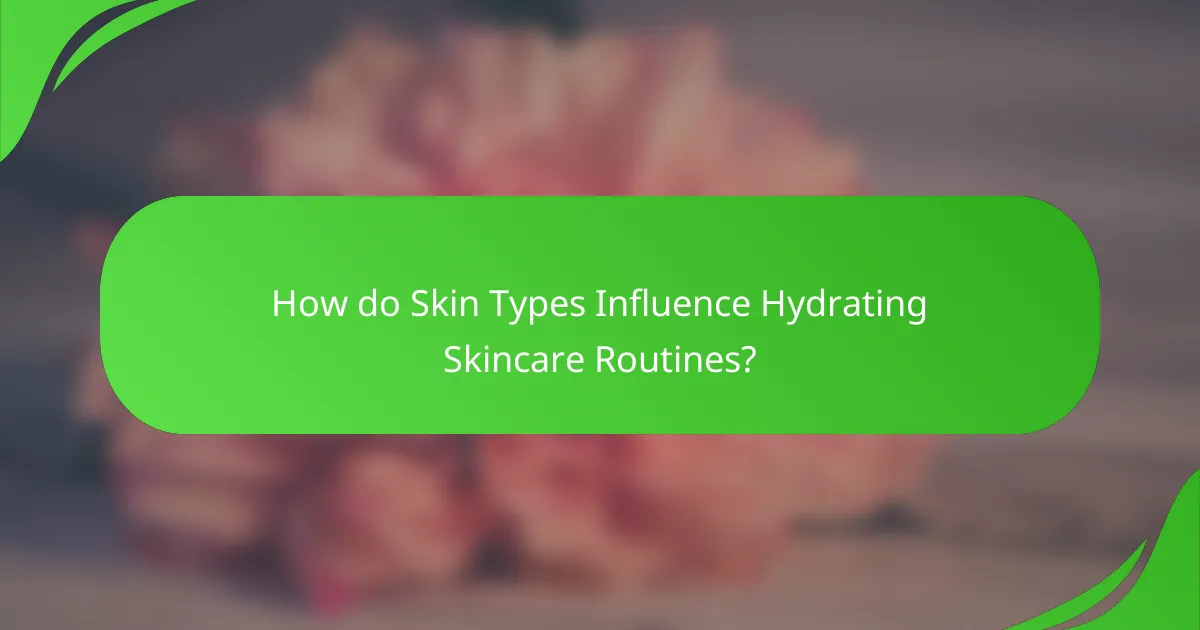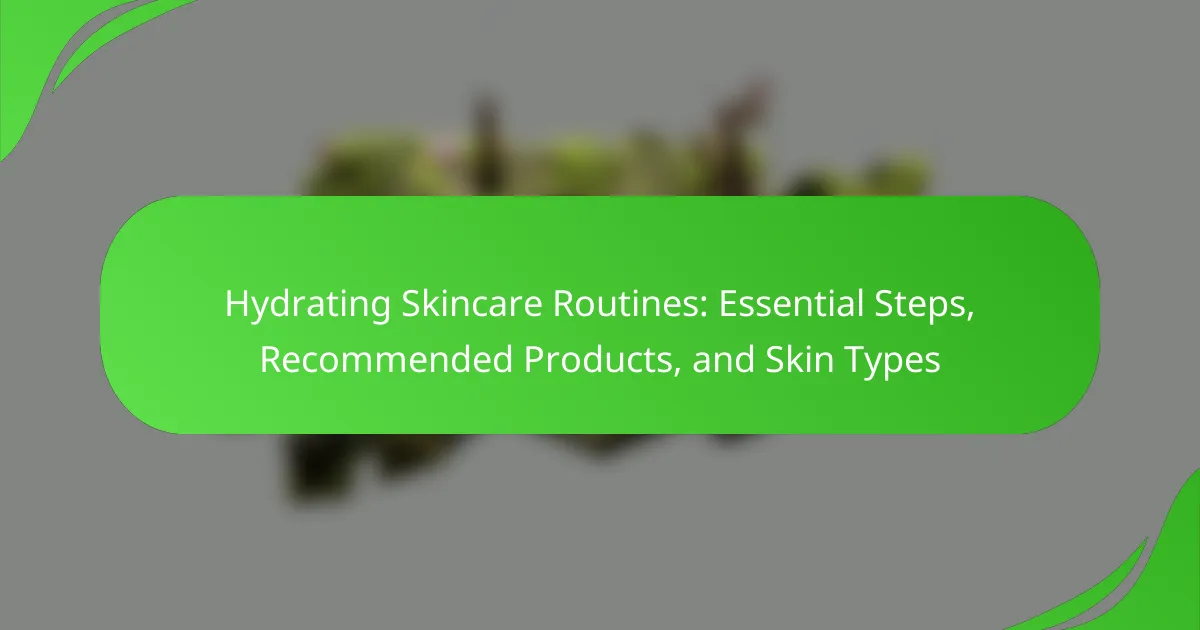Hydrating skincare routines are systematic processes designed to replenish moisture in the skin, consisting of essential steps such as cleansing, toning, applying serums, moisturizing, and using sunscreen. Each step plays a vital role in enhancing skin hydration and maintaining a healthy barrier, with specific products like hyaluronic acid serums and glycerin-based moisturizers recommended for effective hydration. Skin types, including oily, dry, combination, and sensitive, influence the choice of products and formulations, ensuring tailored approaches for optimal hydration. Understanding these components is crucial for improving skin texture, elasticity, and overall health.

What are Hydrating Skincare Routines?
Hydrating skincare routines are systematic approaches aimed at replenishing moisture in the skin. These routines typically include cleansing, toning, applying serums, and moisturizing. Each step is designed to enhance skin hydration and maintain a healthy barrier. Cleansers remove dirt without stripping moisture. Toners help balance skin pH and prep it for subsequent products. Serums often contain concentrated hydrating ingredients like hyaluronic acid. Moisturizers seal in hydration and provide additional nourishment. Consistent use of these steps can improve skin texture and elasticity. Research shows that a well-hydrated skin barrier can reduce signs of aging and enhance overall skin health.
How do Hydrating Skincare Routines benefit the skin?
Hydrating skincare routines benefit the skin by maintaining moisture balance. They help prevent dryness and flakiness. Hydration enhances skin elasticity and firmness. Well-hydrated skin appears healthier and more radiant. These routines can reduce the appearance of fine lines. Ingredients like hyaluronic acid attract water to the skin. Regular hydration supports the skin barrier function. A strong barrier protects against environmental stressors and irritation.
What are the key components of a hydrating skincare routine?
A hydrating skincare routine consists of several key components. The first component is a gentle cleanser. This helps to remove dirt without stripping moisture. The second component is a hydrating toner. Toners can add an extra layer of hydration and prepare the skin for further products. The third component is a serum rich in hydrating ingredients. Serums often contain hyaluronic acid, which can hold up to 1000 times its weight in water.
The fourth component is a moisturizer. A good moisturizer locks in hydration and provides a barrier against moisture loss. The fifth component is a hydrating eye cream. This targets the delicate skin around the eyes, which often needs extra hydration. The final component is sunscreen. Sunscreen protects against UV damage, which can lead to dehydration.
Research shows that incorporating these components can significantly improve skin hydration levels. Studies indicate that hyaluronic acid in serums can enhance skin moisture by up to 30%.
How does hydration impact skin health?
Hydration significantly impacts skin health by maintaining moisture balance. Well-hydrated skin appears plumper and more elastic. It also helps in reducing the appearance of fine lines and wrinkles. Proper hydration aids in skin barrier function, protecting against environmental stressors. Studies indicate that dry skin is more prone to irritation and sensitivity. The skin’s natural barrier relies on adequate hydration to prevent moisture loss. Research shows that drinking enough water can improve skin hydration levels. Therefore, maintaining hydration is crucial for overall skin vitality and appearance.
Why is hydration important for different skin types?
Hydration is crucial for all skin types because it maintains skin health and function. Different skin types, such as oily, dry, combination, and sensitive, have unique hydration needs. Oily skin requires hydration to balance oil production and prevent breakouts. Dry skin needs extra moisture to alleviate tightness and flakiness. Combination skin benefits from targeted hydration that addresses both oily and dry areas. Sensitive skin requires gentle hydration to soothe irritation and maintain the skin barrier. Studies show that well-hydrated skin has improved elasticity and resilience, reducing the appearance of fine lines and wrinkles. Proper hydration also enhances the skin’s ability to retain moisture, leading to a healthier complexion overall.
What unique hydration needs do oily skin types have?
Oily skin types require lightweight, non-comedogenic hydration. This helps to avoid clogging pores and exacerbating oiliness. Hydration for oily skin should focus on water-based products. Ingredients like hyaluronic acid are beneficial as they provide moisture without adding oil. Gel moisturizers are often recommended for oily skin due to their light texture. Regular hydration can help balance oil production. Dehydrated oily skin can lead to increased oiliness as the skin compensates. Therefore, appropriate hydration is crucial for maintaining skin health.
How should dry skin types approach hydration?
Dry skin types should prioritize using thick, emollient moisturizers to enhance hydration. These products create a barrier that locks in moisture. Ingredients like hyaluronic acid and glycerin attract water to the skin. Applying moisturizer immediately after cleansing helps seal in hydration. Regularly using a humidifier adds moisture to the air, benefiting dry skin. Additionally, avoiding hot showers prevents further moisture loss. Research indicates that consistent hydration improves skin barrier function and overall skin health.

What are the Essential Steps in a Hydrating Skincare Routine?
The essential steps in a hydrating skincare routine include cleansing, toning, applying serums, moisturizing, and using sunscreen. Cleansing removes dirt and impurities from the skin. Toning helps to balance the skin’s pH and prepares it for better absorption of subsequent products. Applying serums, particularly those with hydrating ingredients like hyaluronic acid, delivers concentrated moisture. Moisturizing locks in hydration and creates a barrier to prevent moisture loss. Finally, using sunscreen protects the skin from UV damage, which can lead to dehydration. Each step plays a crucial role in maintaining skin hydration and overall health.
How do you properly cleanse the skin for hydration?
To properly cleanse the skin for hydration, use a gentle cleanser suited for your skin type. Start by wetting your face with lukewarm water. Apply the cleanser using circular motions for about 30 seconds. Rinse thoroughly with lukewarm water to remove all product residue. Pat your skin dry with a clean towel, avoiding harsh rubbing. Follow with a hydrating toner or serum to lock in moisture. This method helps maintain skin’s natural barrier and prepares it for hydration. Research shows that using a gentle cleanser can prevent moisture loss and enhance skin hydration (Journal of Clinical and Aesthetic Dermatology, 2015, Dr. E. M. K. Wong et al.).
What types of cleansers are best for hydrating routines?
Cream cleansers and hydrating gel cleansers are best for hydrating routines. Cream cleansers contain moisturizing ingredients like glycerin and oils. They help retain skin moisture while effectively removing dirt. Hydrating gel cleansers often include aloe vera and hyaluronic acid. These ingredients provide hydration without stripping natural oils. Both types are suitable for dry and sensitive skin. Studies show that cream and gel cleansers improve skin hydration levels. This makes them ideal for maintaining a healthy skin barrier.
How often should you cleanse for optimal hydration?
Cleansing should be done twice daily for optimal hydration. This routine helps remove impurities and excess oils. Morning cleansing prepares the skin for hydration. Evening cleansing eliminates dirt and makeup accumulated throughout the day. Studies show that consistent cleansing maintains skin balance. It also enhances the effectiveness of hydrating products. Over-cleansing can lead to dryness and irritation. Therefore, sticking to twice daily is recommended for most skin types.
What role do toners play in hydrating skincare routines?
Toners play a crucial role in hydrating skincare routines. They help to balance the skin’s pH after cleansing. This balance is essential for optimal skin function. Toners also provide an additional layer of hydration. Many toners contain ingredients like glycerin or hyaluronic acid. These ingredients attract moisture to the skin. Studies show that proper hydration improves skin texture and elasticity. Additionally, toners can enhance the absorption of subsequent skincare products. This leads to better overall hydration and effectiveness of the routine.
Which ingredients should you look for in hydrating toners?
Look for ingredients like hyaluronic acid, glycerin, and aloe vera in hydrating toners. Hyaluronic acid retains moisture in the skin, holding up to 1000 times its weight in water. Glycerin acts as a humectant, drawing moisture from the environment into the skin. Aloe vera soothes and hydrates, providing additional nourishment. Other beneficial ingredients include rosewater, which has anti-inflammatory properties, and chamomile, known for its calming effects. These components enhance hydration and improve overall skin texture.
How do toners prepare the skin for further hydration?
Toners prepare the skin for further hydration by balancing its pH and removing impurities. They often contain ingredients that help to tighten pores. This tightening effect allows for better absorption of subsequent hydrating products. Additionally, toners can provide a layer of hydration themselves. Ingredients like glycerin or hyaluronic acid in toners enhance moisture retention. Studies show that using a toner can increase the effectiveness of serums and moisturizers applied afterward. This is due to the skin being prepped and primed for hydration. Using a toner consistently can lead to improved skin texture and overall hydration levels.
What moisturizers are most effective for hydration?
The most effective moisturizers for hydration include those with humectants, occlusives, and emollients. Humectants like glycerin and hyaluronic acid draw moisture into the skin. Occlusives such as petrolatum and dimethicone create a barrier to prevent water loss. Emollients like shea butter and squalane soften and smooth the skin. Products containing these ingredients have been shown to improve skin hydration levels significantly. For instance, a study published in the Journal of Dermatological Science found that hyaluronic acid can increase skin moisture levels by 96% within hours of application.
How do different moisturizer types vary in hydration levels?
Different moisturizer types vary in hydration levels based on their formulation. Creams typically offer higher hydration due to their thicker consistency and higher oil content. Lotions provide moderate hydration, being lighter and containing more water. Gels are often the lightest, delivering hydration through water-based ingredients without heavy oils.
For instance, occlusive agents in creams, like petrolatum, prevent water loss effectively. Lotions balance hydration and absorption, while gels absorb quickly but may not provide long-lasting moisture. These differences impact skin types; dry skin benefits from creams, while oily skin may prefer gels.
What are the best practices for applying moisturizer?
Apply moisturizer on clean, damp skin for optimal absorption. This practice ensures that moisture is sealed in effectively. Use a pea-sized amount for the face and adjust according to the body area. Gently massage the moisturizer into the skin in upward circular motions. This technique promotes circulation and enhances absorption. Allow the moisturizer to fully absorb before applying makeup or other products. This prevents pilling and ensures a smooth application. Reapply as needed throughout the day, especially in dry environments. Consistency in application enhances skin hydration over time.

What Recommended Products Should You Consider?
For hydrating skincare routines, consider products like hyaluronic acid serums, glycerin-based moisturizers, and hydrating [censured] mists. Hyaluronic acid serums attract moisture to the skin, providing intense hydration. Glycerin-based moisturizers lock in moisture, ensuring long-lasting hydration. Hydrating [censured] mists refresh and hydrate the skin throughout the day. Brands like Neutrogena, The Ordinary, and CeraVe offer effective options in these categories. These products are formulated to enhance skin hydration and improve overall skin texture.
What are the top hydrating serums available?
The top hydrating serums available include The Ordinary Hyaluronic Acid 2% + B5, Neutrogena Hydro Boost Water Gel, and Drunk Elephant B-Hydra Intensive Hydration Serum. The Ordinary serum contains hyaluronic acid, which attracts moisture to the skin. Neutrogena’s Hydro Boost features a gel formula that absorbs quickly and provides long-lasting hydration. Drunk Elephant’s B-Hydra serum is packed with pro-vitamin B5, enhancing moisture retention. Each of these products has been well-reviewed for their effectiveness in hydrating the skin.
How do these serums differ in formulation?
Serums differ in formulation primarily based on their active ingredients and intended skin benefits. Some serums focus on hydration, containing ingredients like hyaluronic acid and glycerin. Others may target anti-aging with retinol or peptides. Additionally, serums can vary in texture, ranging from lightweight gels to thicker oils. The pH level can also differ, affecting absorption and efficacy. For example, vitamin C serums often have a lower pH for better stability and effectiveness. Furthermore, serums may include botanical extracts for soothing or antioxidant properties. Each formulation is designed to address specific skin concerns, making them unique in their approach.
What customer reviews say about their effectiveness?
Customer reviews indicate that hydrating skincare routines are generally effective in improving skin moisture levels. Many users report noticeable hydration after consistent use of recommended products. Reviews often highlight enhanced skin texture and reduced dryness as key benefits. Customers frequently mention a visible glow and plumpness in their skin. Some reviews specify that products containing hyaluronic acid yield particularly positive results. Others emphasize the importance of using a complete routine for maximum effectiveness. Overall, feedback suggests that when followed correctly, these routines significantly benefit skin hydration.
Which hydrating masks provide the best results?
Hydrating masks that provide the best results include those with hyaluronic acid, glycerin, and aloe vera. These ingredients are known for their ability to attract and retain moisture in the skin. For example, a study published in the Journal of Cosmetic Dermatology found that hyaluronic acid significantly improves skin hydration levels. Additionally, products like the Laneige Water Sleeping Mask and the Fresh Rose Face Mask are highly rated for their effectiveness. User reviews often highlight their immediate hydrating effects and long-term skin benefits. These masks typically enhance skin elasticity and reduce dryness.
What ingredients should you prioritize in hydrating masks?
Prioritize ingredients such as hyaluronic acid, glycerin, and aloe vera in hydrating masks. Hyaluronic acid retains moisture, holding up to 1000 times its weight in water. Glycerin acts as a humectant, attracting water to the skin. Aloe vera soothes and hydrates while providing anti-inflammatory properties. Other beneficial ingredients include ceramides, which restore the skin barrier, and squalane, which helps lock in moisture. These ingredients are scientifically proven to improve skin hydration and texture.
How often should you use hydrating masks for best results?
Use hydrating masks two to three times a week for best results. This frequency allows the skin to absorb moisture effectively without overwhelming it. Regular application can improve skin hydration levels and overall texture. Studies show that consistent use of hydrating masks enhances skin barrier function. This leads to a more radiant and plump appearance. Adjustments may be necessary based on individual skin type and conditions. For example, those with oily skin may prefer less frequent use.
What are some popular brands known for hydrating skincare?
Popular brands known for hydrating skincare include Neutrogena, Cetaphil, and CeraVe. Neutrogena offers a range of hydrating products like Hydro Boost Gel Cream. Cetaphil is known for its gentle, moisturizing formulas suitable for sensitive skin. CeraVe provides products enriched with ceramides that help restore the skin barrier. Other notable brands are La Roche-Posay, which features hydrating thermal spring water, and Clinique, known for its moisture surge line. These brands are widely recommended by dermatologists for effective hydration.
What unique qualities do these brands offer?
These brands offer unique qualities such as specialized formulas and targeted hydration. Their products often include innovative ingredients like hyaluronic acid and ceramides. Each brand emphasizes skin barrier repair and moisture retention. Some brands focus on eco-friendly packaging and sustainable sourcing. Others provide dermatologically tested options for sensitive skin. Many brands also offer customizable routines tailored to individual skin types. Their commitment to cruelty-free practices enhances their appeal. Overall, these qualities set them apart in the hydrating skincare market.
How do price points affect product selection?
Price points significantly influence product selection in hydrating skincare routines. Consumers often associate higher prices with better quality and efficacy. Research shows that 70% of consumers perceive premium-priced products as more effective. Conversely, lower-priced products may appeal to budget-conscious shoppers. Price sensitivity varies by demographics and skin types. For instance, younger consumers may prioritize affordability over brand reputation. In contrast, older consumers may invest more in high-end products for perceived long-term benefits. Thus, price points play a critical role in shaping consumer choices in skincare.

How do Skin Types Influence Hydrating Skincare Routines?
Skin types significantly influence hydrating skincare routines. Oily skin requires lightweight, non-comedogenic products to avoid clogging pores. Dry skin benefits from richer creams and oils to restore moisture. Combination skin needs a balanced approach, using both lighter and heavier products on different areas. Sensitive skin may require fragrance-free and hypoallergenic options to prevent irritation. Each skin type responds differently to ingredients, impacting the effectiveness of hydration. For instance, hyaluronic acid is beneficial for all skin types, but oily skin may prefer gel formulations, while dry skin might favor creams. Understanding these differences helps tailor routines for optimal hydration.
What are the hydration needs for sensitive skin?
Sensitive skin requires gentle hydration to maintain its barrier function and prevent irritation. It typically needs products that are fragrance-free and formulated with soothing ingredients. Hydration can be enhanced with humectants like glycerin and hyaluronic acid. These ingredients attract moisture and help retain it in the skin. Additionally, occlusives such as shea butter or ceramides provide a protective layer to minimize water loss. Studies show that sensitive skin often lacks lipids, making it more prone to dryness. Therefore, using rich moisturizers can significantly improve hydration levels. Regular application of hydrating products is essential for managing sensitivity.
How can you identify suitable products for sensitive skin?
To identify suitable products for sensitive skin, look for those labeled as hypoallergenic or specifically formulated for sensitive skin. These products typically contain fewer irritants and are less likely to cause reactions. Check the ingredient list for soothing components like aloe vera, chamomile, or calendula. Avoid products with fragrances, alcohol, or harsh exfoliants, as these can exacerbate sensitivity. Patch testing new products on a small skin area can help determine compatibility. Dermatologists often recommend products with minimal ingredients to reduce the risk of irritation. Studies show that formulations with ceramides and glycerin can help maintain the skin barrier, making them ideal for sensitive skin.
What precautions should be taken when hydrating sensitive skin?
When hydrating sensitive skin, avoid products with fragrances and alcohol. These ingredients can irritate the skin and exacerbate sensitivity. Use gentle, hypoallergenic moisturizers formulated for sensitive skin. Look for products containing soothing ingredients like aloe vera or chamomile. Apply moisturizer to damp skin to lock in moisture effectively. Perform a patch test before using new products to check for adverse reactions. Hydrate from within by drinking plenty of water daily. Lastly, consider consulting a dermatologist for personalized recommendations.
How can combination skin effectively balance hydration?
Combination skin can effectively balance hydration by using lightweight moisturizers and targeted treatments. Lightweight moisturizers provide hydration without clogging pores. They help to nourish dry areas while preventing excess oil in the T-zone. Targeted treatments can address specific concerns, such as using gel-based products for oily areas and cream-based products for dry spots.
Incorporating hydrating ingredients like hyaluronic acid supports moisture retention. Hyaluronic acid can hold up to 1000 times its weight in water, making it effective for all skin types. Regular exfoliation helps remove dead skin cells, promoting better absorption of hydrating products.
Using a gentle cleanser maintains the skin’s natural barrier. A balanced pH in cleansers prevents over-drying or excessive oiliness. Finally, applying products in layers allows for better hydration control. This method ensures that each layer is absorbed effectively, leading to balanced hydration throughout the skin.
What products work best for combination skin types?
Products that work best for combination skin types include lightweight moisturizers, gel-based cleansers, and non-comedogenic sunscreens. Lightweight moisturizers hydrate without clogging pores. Gel-based cleansers effectively remove excess oil while maintaining moisture balance. Non-comedogenic sunscreens protect the skin without causing breakouts. Products with hyaluronic acid are beneficial for hydration. Ingredients like salicylic acid help control oil in the T-zone. Look for formulations labeled as suitable for combination skin. These products address both dry and oily areas effectively.
How can you adjust routines seasonally for combination skin?
To adjust routines seasonally for combination skin, incorporate lighter products in warmer months and richer formulations in colder months. During summer, use gel-based moisturizers to prevent excess oiliness. In winter, opt for cream-based moisturizers to combat dryness.
Additionally, exfoliate more frequently in spring to remove dead skin cells and enhance skin texture. In fall, focus on hydration with serums containing hyaluronic acid.
Monitor skin’s response to seasonal changes. Adjusting products based on humidity and temperature helps maintain balance. Research indicates that skin’s moisture levels fluctuate with seasons, affecting combination skin’s needs.
What tips can enhance your hydrating skincare routine?
To enhance your hydrating skincare routine, incorporate products with hyaluronic acid. Hyaluronic acid can hold up to 1000 times its weight in water, providing intense hydration. Additionally, apply products on damp skin to lock in moisture. This method helps to maximize absorption and effectiveness. Use a gentle exfoliant regularly to remove dead skin cells. This process allows better [censured] of hydrating ingredients. Consider using a humidifier in dry environments. Humidifiers add moisture to the air, benefiting skin hydration. Lastly, drink plenty of water daily. Staying hydrated internally supports overall skin health.
How can lifestyle choices impact skin hydration?
Lifestyle choices significantly impact skin hydration. Factors such as diet, hydration levels, and sun exposure play crucial roles. A diet rich in antioxidants and healthy fats can improve skin moisture. Consuming adequate water helps maintain skin elasticity and suppleness. Conversely, excessive alcohol and caffeine can lead to dehydration. Regular sun protection prevents moisture loss from UV damage. Additionally, smoking can impair blood circulation, reducing skin hydration. Stress management through activities like yoga can also enhance skin health. Overall, positive lifestyle choices support optimal skin hydration.
What common mistakes should be avoided in hydrating routines?
Common mistakes in hydrating routines include neglecting to drink enough water. Insufficient water intake can lead to dry skin. Another mistake is using products with alcohol, which can dehydrate the skin further. Over-exfoliating can strip natural oils and worsen dryness. Applying hydrating products on dry skin reduces their effectiveness. Skipping sunscreen can allow UV damage, leading to dehydration. Lastly, ignoring seasonal changes can affect hydration needs, as skin may require different care in winter versus summer.
Hydrating skincare routines are systematic approaches designed to replenish moisture in the skin through key steps such as cleansing, toning, applying serums, and moisturizing. This article outlines the benefits of hydration for various skin types, highlighting the unique hydration needs of oily, dry, combination, and sensitive skin. It also details essential components of a hydrating routine, recommended products, and best practices for application to enhance skin health and maintain a balanced moisture level. Additionally, the article emphasizes the impact of lifestyle choices and common mistakes to avoid in order to achieve optimal skin hydration.


